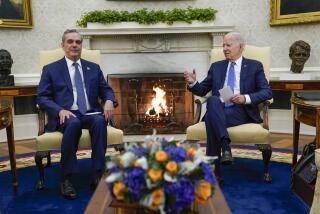U.S. Exporters Want Banks to Ease Latin Nations’ Debt
- Share via
WASHINGTON — The nation’s massive trade deficit could be cut sharply if banks holding much of the $377 billion owed by Latin American countries forgave or substantially reduced interest payments, a cross-section of export-industry representatives told a Senate subcommittee Monday.
Farmers, equipment manufacturers and several spokesmen for Third World interests argued that more than 600,000 U.S. jobs have disappeared as a result of sagging exports to Latin American countries saddled with heavy debts.
Although no representatives of the financial community were invited to the hearing, committee officials denied that the session was an exercise in “mugging the banks.” David Apgar, an aide to subcommittee chairman Sen. Bill Bradley (D-N.J.), said the banks will “be there in force” at a follow-up session next month.
Bradley, a leading advocate of debt relief to help solve the debt crisis, and his newly created subcommittee are attempting to develop a “long-term strategy” for the trade and debt problem, Apgar said. Witness Richard E. Feinberg, vice president of the Overseas Development Council, a nonprofit group that advocates understanding the problems of underdeveloped nations, testified that “the annual $50-billion-plus trade deficit that the United States is running up with the Third World is the inevitable counterpart” of Third World debtor nations’ payment problems.
Sally Shelton-Colby, a consultant on Latin American issues who was a State Department official during the Carter Administration, called on Congress to join some Third World debtors in pressing banks to cut or eliminate interest requirements. Brazil, for example, suspended interest payments late last month.
She said interest payments by Latin debtors last year were more than twice as high as their net earnings from trade, measured as a percentage of gross domestic product. She and witness Roberto Santiago, a representative of Brazil’s General Confederation of Labor, warned that debt-payment pressures are threatening to cause unrest in fragile democracies in the region.
More to Read
Sign up for Essential California
The most important California stories and recommendations in your inbox every morning.
You may occasionally receive promotional content from the Los Angeles Times.












